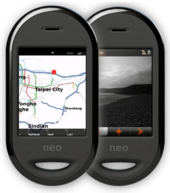- Openmoko
-
For the mobile telephone operating system, see Openmoko Linux.
Openmoko is a project to create a family of open source mobile phones, including the hardware specification and the operating system.[1] The project was sponsored by Openmoko Inc.
The first sub-project is Openmoko Linux, a Linux-based operating system designed for mobile phones, built using free software.
The second sub-project is developing hardware devices on which Openmoko Linux runs. The first device released was the Neo 1973,[2][3] which was followed up by the Neo FreeRunner on 25 June 2008.[4] Unlike most other mobile phone platforms, these phones are designed to provide end users with the ability to modify the operating system and software stack. Other Openmoko-supported phones are also available.
On 2 April 2009, Openmoko canceled planned phones and will probably concentrate on other kinds of hardware,[5] but will still support and sell the current Neo FreeRunner.[6]
Contents
Software
Originally Openmoko Inc. developed its own operating system for the phones, which was called Openmoko Linux or Om. It uses the Linux kernel, together with a graphical user environment built using the X.Org Server. The OpenEmbedded build framework and opkg package system were used to create and maintain software packages. The initial version named Om 2007 used the GTK+ toolkit and the Matchbox window manager. Om 2008, which was released in August 2008, added support for the Qt toolkit and Enlightenment 17. Despite continuous improvements both of these versions did not reach a stable state. As a result, Openmoko started developing Om 2009, which had the goal of providing a stable environment based on the middleware from freesmartphone.org, a project that was financed by Openmoko. However, this version was not finished either, and in April 2009 Openmoko cancelled the development of software.
This task was taken over by a several efforts of the community. Several groups have created modified versions of the original software or ported other systems to work on the phones. Among others, the Openmoko phones now support Android, Debian, Gentoo, Qt Extended Improved, QtMoko, and SHR.
Hardware
 the Neo 1973, the first smartphone using the Openmoko software
the Neo 1973, the first smartphone using the Openmoko software
Openmoko hardware aspires to the term open-source hardware although in various areas the availability of cell phone components and legal requirements prevent full conformance to this term.[citation needed]
As do many other vendors, Openmoko Inc., notoriously failed to meet the publicly announced hardware release dates, and postponed releases many times.
The first supported phone, the Neo 1973 GTA01 (version: Bv4), was distributed exclusively through openmoko.com from July 2007 to February 2008.
The second revision of hardware based on the GTA01 design is the Dash Express, an automotive navigation system. The Dash Express has a faster CPU (Samsung 2440) and Wi-Fi ability.
The third hardware platform, the Neo FreeRunner codenamed GTA02 is an improved version of the Neo 1973.
Neo 1973
Main article: Neo 1973The Neo 1973 (codenamed GTA01) phone was a "developers only" release. This phone supports the 900 MHz, 1800 MHz and 1900 MHz GSM frequency bands. Many Linux and unix programs used on desktop and server platforms, including utilities and games, have been successfully run on the phone. In addition to Linux, the NetBSD, FreeBSD and L4 kernels have been adapted by users to run on the platform or are under development.
This hardware platform can be emulated in software with a high level of compatibility using a version of Qemu included in the Openmoko software suite.
Neo FreeRunner
Main article: Neo FreeRunnerThe Neo FreeRunner (codenamed GTA02) is the new revision of the Neo 1973. The changes include a faster processor (clocked at 400 MHz), 802.11b/g Wi-Fi, two accelerometers and 3D graphics acceleration. It was released for the mass market on 25 June 2008.[4]
Dash Express
Main article: Dash ExpressOn 2 January 2008 the Dash Express, a GPS device, with hardware developed by Openmoko Inc. was announced running Openmoko Linux.[7] This device, initially codenamed the HXD8, seems to use little or none of the openmoko user-interface, simply using patches to the kernel developed by Openmoko Inc, and running an application from Dash Navigation on it to provide navigation and a user interface.
Canceled devices
The next phone, GTA03,[8] would have been based on newer and more powerful system-on-a-chip. It would presumably differ from the Neo FreeRunner by having a 3.5 mm audio jack connector (instead of a 2.5 mm connector), EDGE and a camera.[9][10][11] GTA03 would not include support for 3G networks.[12]
The fourth Openmoko planned, GTA04, would have been based on a different system-on-a-chip. It would have had 3G support.[13]
Golden Delicious GTA04 Board
Golden Delicious GmbH of Munich, a mobile office solutions provider and vendor of upgraded Freerunners, announced in September 2010 the release of the Openmoko Beagle Hybrid, a platform using the Beagle Board as a basis for developing and prototyping a next generation Openmoko phone.[14] The following month Golden Delicious stated their long term goal of bringing such a phone to market.[15] A new board, under the GTA04 name of the defunct FIC initiative with similar objectives, which fits into the Freerunner case and connects to the existing display and other components, is listed for preorder on the Golden Delicious website with a provisional shipping date of 5 February 2011.[16]
WikiReader
The latest product is the WikiReader, a device to read Wikipedia articles offline.[17]
History
Openmoko was announced the 7th November 2006[18] by its founders First International Computer (FIC).[19]
The Initial core team for Openmoko project included:
- Werner Almesberger
- Michael Lauer
- Sean Moss-Pultz
- Harald Welte
Etymology
The name Openmoko is an initialism for Open Mobile Kommunikations.[20] The company was named OpenMoko until early 2008 when it was renamed Openmoko.
The codename for the phone product series, GTA, is an abbreviation of "GSM-TI-AGPS" which indicates the main components of the phone.[21]
See also
- Android (operating system)
- Comparison of open source software hosting facilities
- LiMo Foundation
- Linux Phone Standards Forum
- Maemo
- Mobilinux
- Open Handset Alliance
- Open Mobile Alliance
- OpenBTS
- SHR (Stable Hybrid Release)
- Qt Extended
- TuxPhone
References
- ^ openmoko-announce - Free Your Phone
- ^ "Neo1973". Openmoko Wiki. Openmoko. 2008-05-21. http://wiki.openmoko.org/wiki/Neo1973. Retrieved 2008-06-25.
- ^ "Neo Base". Openmoko. 2008. Archived from the original on 2008-06-22. http://web.archive.org/web/20080622125451/http://www.openmoko.com/products-neo-base-00-stdkit.html. Retrieved 2008-06-25.
- ^ a b "Open source phone goes mass-market". LinuxDevices.com. 2008-06-25. http://www.linuxdevices.com/news/NS9978560959.html. Retrieved 2008-07-04.
- ^ "No More OpenMoko Phone". http://mobile.slashdot.org/article.pl?sid=09/04/04/228240.
- ^ "Openmoko Phone Not Dead After All". http://mobile.slashdot.org/article.pl?sid=09/04/09/220244.
- ^ "Openmoko Extends Mobile Phone to Power Next-Generation Dash GPS". Reuters (press release). 2008-01-02. http://www.reuters.com/article/pressRelease/idUS101671+02-Jan-2008+BW20080102.
- ^ "GTA03 preliminary hardware details". http://wiki.openmoko.org/wiki/GTA03.
- ^ "2.5mm or 3.5mm". http://lists.openmoko.org/pipermail/community/2008-June/019605.html.
- ^ "QVGA V/s VGA for GTA03 (was something about yummy CPU-GPU combos!)". http://lists.openmoko.org/pipermail/community/2008-June/018893.html.
- ^ "Is case design changing for GTA03?". http://lists.openmoko.org/pipermail/community/2008-June/018791.html.
- ^ "No 3G for GTA03, 2G/EDGE only?". http://lists.openmoko.org/pipermail/community/2008-June/018948.html.
- ^ No 3G for GTA03, 2G/EDGE only?
- ^ openmoko-community - Openmoko Beagle Hybrid
- ^ openmoko-community - complete phones
- ^ GTA04
- ^ "WikiReader Official Website". http://wikireader.com.
- ^ "Openmoko mailing list". http://lists.openmoko.org/pipermail/community/2010-October/063653.html.
- ^ "Cheap, hackable Linux smartphone due soon". http://www.linuxdevices.com/news/NS2986976174.html.
- ^ http://www.openmoko.com/press/OpenMoko_20061107.pdf
- ^ http://lists.openmoko.org/pipermail/community/2009-April/045297.html
External links
Categories:- Embedded Linux distributions
- Linux-based devices
- Mobile telecommunications software
- Open source mobile phones
- Mobile phone standards
- Openmoko
- ARM architecture
Wikimedia Foundation. 2010.

